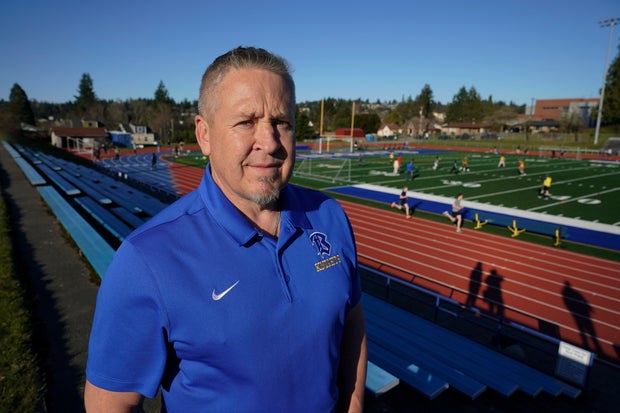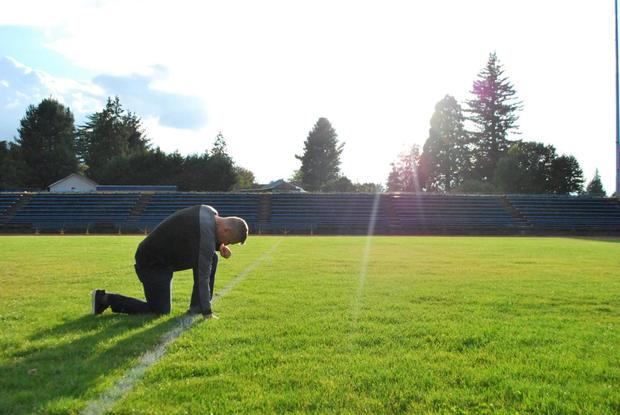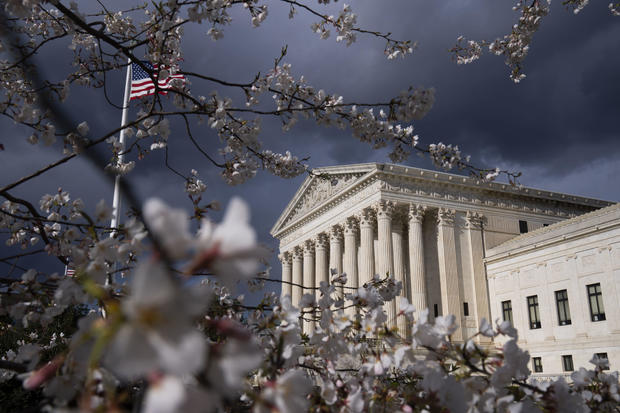Washington — It was after watching the sports film “Facing the Giants” that Joseph Kennedy, then a new coach for the Bremerton High School football team in Washington state, was inspired to pray.
And so, after coaching his first game for the Bremerton Knights in August 2008, Kennedy walked to the 50-yard-line, “on the battlefield,” the retired U.S. Marine says, and took a knee to offer a prayer of gratitude.
It began with the coach, alone, briefly thanking God after the final whistle for keeping the players safe, for fair play and for spirited competition. But soon enough, the number of players gathering alongside Kennedy after games grew to include a majority of the team, though participation varied. At least one parent said his son felt “compelled to participate” out of fear he would lose out on playing time.
And soon enough, the prayers by Kennedy, himself a graduate of Bremerton High School, evolved into motivational speeches with religious references.
Ted S. Warren / AP
For seven years, Kennedy continued his practice of praying on the field with no issues. But in September 2015, the Bremerton School District learned what he was doing when an opposing team’s coach told Bremerton High School’s principal that Kennedy asked his players to join him for the post-game prayer, saying he “thought it was pretty cool” the district would allow such activity, according to court records.
That observation by the opposing coach served as the catalyst for a yearslong battle between Kennedy and the school district, the venue for which shifted from the gridiron to the courts when the coach lost his job after defying directives to end his practice of praying on the field.
Kennedy argued he was engaging in constitutionally protected religious expression, and on Monday, the United States Supreme Court will weigh his bid to get his coaching job back and be allowed to pray at midfield after games.
“It seems so simple to me: It’s a guy taking a knee by himself on the 50-yard-line, which to me doesn’t seem like it needs a rocket scientist or a Supreme Court justice to figure out,” he told CBS News. “I didn’t want to cause any waves, and the thing I wanted to do was coach football and thank God after the game.”
But for defenders of the school district, Kennedy was acting as an agent of the state who, as a public school employee, violated the religious freedom of students who felt pressure to pray-to-play.
“When a coach uses the power of his job to be in a place and have access to students at a time when they’re expected to encircle him and come to him, that’s an abuse of that power and a violation of the Constitution,” Rachel Laser, president and CEO of Americans United for Separation of Church and State, told CBS News’ Jan Crawford. “Religious freedom is not the right to impose your religion on others. We all need to have it, so that’s why the free exercise and establishment clause work together to protect religious freedom for all of us.”
“Giving up is not something that’s in my blood”
After the Bremerton School District learned of Kennedy’s post-game practice of praying at midfield in September 2015, it launched an investigation into whether he was complying with the school board’s policy on religious-related activities and practices.
While acknowledging that Kennedy had “not actively encouraged, or required, participation” in either a pre-game prayer in the locker room or his “inspirational talk at midfield” after games,” the district said in a letter dated September 17, 2015, that the activities likely would violate the First Amendment’s Establishment Clause and expose the district to “significant risk of liability.”
“Bremerton High School legally risks endorsing or favoring one set of religious views over others and that’s not what the Constitution promises,” Laser said. “Religious freedom, those 16 words of our First Amendment of our Constitution are a shield that protects religious freedom for all of us, not just religious freedom for some of us.”
The district told Kennedy that his talks with students must remain entirely secular, and future religious activity he engages in, including prayer, must not interfere with his job duties, must be separate from any student activity and may not have participation from the students.
In compliance with the district’s request, Kennedy temporarily stopped praying on the field after games. But one month later, in mid-October 2015, he informed the district through an attorney that he would resume saying a post-game prayer at the 50-yard-line after requesting a religious accommodation under Title VII of the Civil Rights Act, which prohibits discrimination on the basis of religion.
“No reasonable observer could conclude that a football coach who waits until the game is over and the players have left the field and then walks to mid-field to say a short, private, personal prayer is speaking on behalf of the state,” his lawyer said in a letter to the Bremerton School District. “Quite the opposite, Coach Kennedy is engaged in private religious expression upon which the state may not infringe.”
And so, after the final whistle at Bremerton’s homecoming game on October 16, 2015, Kennedy shook hands with the opposing team, waited until players were singing their fight song, and then knelt at the 50-yard-line, bowed his head, and, joined by players from both teams, members of the media and the public, prayed.
He did so again for the next two games, after which the district placed Kennedy on paid administrative leave from his position as an assistant coach for violating its directives. During a subsequent evaluation of Kennedy’s performance, Bremerton’s athletic director recommended he not be rehired for the next season, citing a failure to follow district policy and failure to supervise student-athletes after games.
Kennedy chose not to reapply for his coaching position at Bremerton High School, and, in August 2016, filed suit against the Bremerton School District in federal district court in Tacoma, Washington, arguing it violated his constitutional rights to free speech and free exercise.
U.S. District Judge Ronald Leighton ruled against Kennedy, finding that “while public schools do not have unfettered discretion to restrict an employee’s religious speech, they do have the ability to prevent a coach from praying at the center of the football field immediately after games.”
Kennedy appealed to the 9th U.S. Circuit Court of Appeals, which affirmed the district court’s ruling. He then turned to the Supreme Court, and in 2019, the high court declined to hear his case.
In a statement from Justice Samuel Alito and joined by Justices Clarence Thomas, Neil Gorsuch and Brett Kavanaugh, the four justices said it was premature for the Supreme Court to hear Kennedy’s case at that time, but warned the 9th Circuit’s “understanding of the free speech rights of public school teachers is troubling and may justify review in the future.”
“What is perhaps most troubling about the 9th Circuit’s opinion is language that can be understood to mean that a coach’s duty to serve as a good role model requires the coach to refrain from any manifestation of religious faith — even when the coach is plainly not on duty,” Alito wrote.
After additional proceedings, Kennedy again suffered losses in the lower courts. A three-judge panel of judges on the 9th Circuit ruled in March 2021 that the school district’s efforts to prevent Kennedy from praying did not violate his constitutional rights, and his postgame speech on the field was speech as a government employee.
“At issue in this case is not, as Kennedy attempts to gloss it, a personal and private exercise of faith,” Judge Milan Smith Jr. wrote for the unanimous panel. “At issue was — in every sense of the word — a demonstration, and, because Kennedy demanded that it take place immediately after the final whistle, it was a demonstration necessarily directed at students and the attending public.”
The full 9th Circuit declined to re-hear the case, and Kennedy again appealed the decision to the Supreme Court in September. The high court agreed in January to take up the dispute.
“I was a Marine for 20 years. Supporting and defending the Constitution means a lot to me. Giving up is not something that’s in my blood, it’s not in my nature,” Kennedy said of his lengthy legal fight to get his job back. ” I can look at myself in the mirror, look at my team over the years, and hold my head up high and look them in the eyes and say hey, I fought the good fight, I didn’t give up.”
Kennedy’s court battle with the school district will come before a Supreme Court that has shifted further rightward since 2019, when the justices first spurned his request to hear his case. Now with a 6-3 conservative majority, the high court has in recent terms been more sympathetic to religious rights.
“The state does not own every ounce of your free expression. They can’t censor you from everything you do,” Jeremy Dys, special counsel for First Liberty, which is representing Kennedy, told CBS News. “The Establishment Clause does not mean you must censor and stamp out any religious demonstration.”
Bloomberg
“Courageous to some and offensive to others”
In filings with the Supreme Court, lawyers for the district argue it acted within its authority to regulate Kennedy’s “very public speech” and claim he “tells a breathless tale of authoritarian government forbidding private religious expression, insisting that unless the court applies his preferred legal test, religious practice will be quashed across the country.”
Under the Supreme Court’s jurisprudence, the school district’s interest in shielding students from religious coercion and preventing employees from “commandeering government events” outweighs Kennedy’s interest in praying with students, the district argued.
Laser noted that Kennedy was not precluded from praying on his own, even if he was considered “on duty.” But it was the place and time at which he chose to engage in the practice that left students feeling pressured to join.
“If this coach were in fact doing what he says he was doing, which is praying in a private and solitary manner, we wouldn’t be here, because that’s fine. You don’t have to leave that behind when you become a public official,” she said. “But religious freedom is not the right to use the power of the state to favor one set of religious beliefs over others, to impose one set of religious beliefs on public school students.”
The dispute between Kennedy and the Bremerton School District has attracted a slew of friend-of-the-court briefs, including from current and former National Football League players, and former collegiate athletes and coaches.
In one brief filed in support of Kennedy on behalf of Minnesota Vikings quarterback Kirk Cousins, Chicago Bears quarterback Nick Foles and former NFL quarterback Drew Stanton, among others, the current and former players invoked Colin Kaepernick — though at first not by name — kneeling during the national anthem to protest racial injustice.
“That practice, like Kennedy’s prayers, is controversial — courageous to some and offensive to others,” they argued. “But if Joe Kennedy had taken a knee to protest racial injustice, the district almost certainly would not have argued that his speech was somehow the state’s. Rather, there would have been no question that it was protected private speech.”
As the players “can attest from their experience at all levels of sports— high school, college, and pro — audiences understand symbolic acts of speech on the field to reflect the views of the individual athletes and coaches who engage in them, whether they are Colin Kaepernick, Tim Tebow, Shaquille O’Neal, or Joe Kennedy. The analysis does not change because the speech is religious rather than political,” they told the Supreme Court.
Dys, too, said that the First Amendment protects the rights of both Kaepernick and Kennedy to take a knee, whether in an expression of free speech or free exercise.
“One is speech and one is free exercise, but they’re within a few words of each other,” he said. “They are both protected by the First Amendment, and they’re allowed to have that right.”
But a group of former professional football players and collegiate athletes in support of the school district warned the relationship between a coach and athlete in high school athletics is unique, as it is “highly susceptible to being coercive,” and should be considered by the Supreme Court as it weighs the case.
“The record here demonstrates that Mr. Kennedy’s actions had the propensity to, and did, lead players to feel compelled to participate in Mr. Kennedy’s expressions of faith even if they would rather not have done so,” the former athletes, including former Minnesota Vikings punter Chris Kluwe and former NFL running back Obafemi Ayanbadejo.
A decision from the Supreme Court is expected by the end of June.


